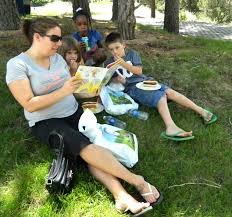Six Suggestions to Encourage Your Students to Love Reading
These are some ways that you, as a teacher, parent, or guardian, can do to help students learn to love to read. There's nothing more precious than cultivating a love of reading in a student, especially if it's something you loved doing growing up. It's a worthy cause, and one that we can all get behind.
Read!
This first suggestion comes from Theresa Knudson, an English teacher at Brit Student: "It may seem too simple or obvious, but we can't encourage kids to read if we aren't passionate about it too. Whether you're reading to learn something new, connect with other people, or just for pleasure, increase your reading and make sure your kids see you reading too."
Share what you read about.
It's not enough just to read, but you should also be sharing with your students, your colleagues and others around you about your reading experiences. Let them know what you're reading, what you've learned so far, and your recommendations. Share your favorite passages with your students, your book club discussions, and your excitement every time you can open your book and read some more. Once kids see that reading is exciting, and fun, and something you can share with others, they will be more encouraged to do it themselves. In fact, reading can be a very social experience. You can create your own book club or reading group, and students will see that they can make friends based on what books they like.
Host a read-a-thon for your class or school.
This is a great event that can involve the whole school, parents, and school administrators. Bring your pillows and stuffed animals, wear your pyjamas, and spend the day at school sharing your favorite books or reading a book that day. Bring snacks and read stories to each other. It's an excellent way to encourage a love of reading, raise money, and host an event that parents can also get involved in.
Bring your students on a reading field trip.
Going on a field trip is the perfect way to make reading exciting. You can go to your local library, or a nearby library with a lot of history. Alternatively, go to a university library or bookstore. It's less about getting new books but the importance of physical books, being surrounded by them all in a place that respects reading. As per Philip B. Fields, a librarian at Australia2Write, by doing so "you're opening their eyes to all the possibilities to explore and learn. Encourage them to go to their library on their free time and check out books regularly; it can become a great family bonding experience on the weekend and involves their parents too."
Show them the connection between reading and real life issues.
This is a very important one for teachers in the classroom. You shouldn't hesitate to show your students that reading can be linked to real-world issues. They can learn so much about different cultures in the world and how they interacted with books. It will show how various cultures have had to protect their books, books have become banned, the struggle of slaves to become literate in spite of prohibitions. Showing them the greater historical and political context might give them a greater appreciation for reading.
Show them different reading strategies.
Teachers and educators must be responsible for teaching kids how to read. There are many different reading strategies for kids who don't enjoy reading or struggle to do so. They will never enjoy reading if they have trouble doing it so we have to give them the right skills and training so we show them more than just the right attitude but also the tools to read.
It's clear by reading this that there are so many things we can do as teachers, administrators, and parents to make reading enjoyable and exciting for kids. The list can go on and on, but at the end of the day, it's all about having the right attitude, leading by example, and giving students the right tools and skills for them to grow to love reading as much as we do.
Guest Blogger: Joel Syder, a literacy teacher and writer at Next Coursework and PhD Kingdom, loves getting teachers and students involved in reading initiatives. His passion is the field of education and increasing literacy across the world.
Search Internet4Classrooms

Custom Search







